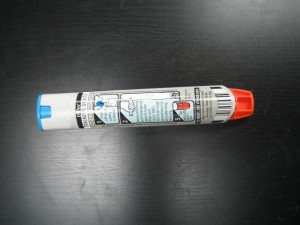Anaphylaxis is a severe allergic reaction that usually manifests rapidly and can lead to death. This is a medical emergency that entails immediate treatment and follow-up care by a doctor.
Many individuals might not realize that they have an allergy until they experience anaphylaxis. The doctor or allergist will assess the individual to make a proper diagnosis. If needed, the doctor will prescribe injectable epinephrine to be used during emergencies.
Anaphylaxis is instigated once the immune system overly reacts to harmless substances which cause mild to severe symptoms that affect different parts of the body. The symptoms typically manifest within minutes to a few hours after stung by an insect, eating a certain food or using a medication.

This severe reaction entails immediate medical treatment including an injection of epinephrine and a follow-up care in the emergency department. If not treated correctly, anaphylaxis can be deadly. Oftentimes, the symptoms vanish and then return a few hours later, thus it is vital to take these steps as soon as a reaction starts.
What are the symptoms?
- Circulation: bluish/pale color, dizziness, low pulse, low blood pressure, lightheadedness, loss of consciousness, shock
- Respiratory: shortness of breath, wheezing, cough, throat tightness, chest tightness or pain, hoarse voice, itchy mouth or throat, difficulty swallowing, nasal congestion/stuffiness
- Gastrointestinal: vomiting, nausea, diarrhea, abdominal pain/cramping
- Skin: swelling, hives, itchiness, redness, warmth, rash
Other symptoms include anxiety, itchy or watery eyes, feeling of impending doom, cramping of the uterus and headache.
The dangerous symptoms include breathing difficulty, low blood pressure and loss of consciousness. If the individual has any of these symptoms, especially after eating or stung by an insect, seek immediate medical care right away.
What are the common causes?
- Food (tree nuts, peanuts, fish, milk, shellfish, preservatives and eggs)
- Insects (honeybees, yellow jackets, hornets, paper wasps and fire ants)
- Latex (products made out of natural latex contain allergens that can trigger reactions among sensitive individuals)
- Medications (antibiotics and anti-seizure medications)
- Exercise
Treatment
If an individual experiences an allergic reaction, the injectable epinephrine must be administered and bring him/her to the nearest emergency department. Once the reaction is treated, the less severe it will become.
Once the individual had an anaphylactic reaction, a doctor should be consulted for proper diagnosis and provide the ideal treatment plan. Remember that avoidance of the potential allergens is the ideal way to stay safe, but entails a great deal of education.
In some cases, the allergist might require the individual to wear special jewelry that identifies that he/she is at risk for severe allergy. This will provide doctors and others vital information regarding the medical condition of the individual.
Always remember that proper care can make a difference between suffering with an allergic condition and feeling better. By consulting a doctor, an accurate diagnosis can be given as well as provide a suitable treatment plan.
